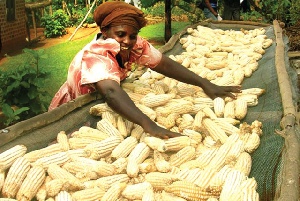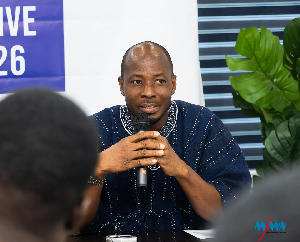A US$4 million Ghana Advanced Maize Seed Adoption Programme (GAMSAP) to boost maize production among smallholder farmers has been launched in Tamale.
The four-year programme was started in July 2014 and is a partnership initiative of Feed the Future undertaken by DuPont, an international organisation that deals with issues related to agricultural development, and the United States Agency for International Development (USAID) aimed at increasing incomes of smallholder farmers to expand their business and engage more of the youth to improve livelihoods for the farmers and nation at large.
It is also to support the establishment of more than 3,200 demonstrations throughout the country to help enhance the income of 43,000 smallholder maize farmers.
Launching the programme in Tamale, Jim Bever, the Ghana Mission Director of USAID, said high quality seed (both local and international) is a key to the modernisation and profitability of the agricultural sector, and therefore encouraged farmers to invest in their businesses with productivity-boosting technologies.
He said the USAID is committed to supporting development of local varieties through the Savannah Agricultural Research Institute to meet the needs and interests of all farmers, as well as link them to the aggregators and buyers to enable farmers benefit from their productivity.
Mr. Emmanuel Asante-Krobea, Director of Crop Service Ministry of Food and Agriculture, noted that Ghana currently has an average maize yield of about 1.5 metric tonnes per hectare, which is significantly below the average 2 tonnes per hectare of maize yields in Africa and 10 tonnes per hectare in the U.S.
He said adopting the hybrid seed will improve the farming inputs and techniques, from which the participating farmers will be able to achieve significant productivity gains and increased profitability.
The Director stressed the need for the private sector to contribute its quota to enhancing the economy, since the nation has the potential of producing quality products to boost food security in the country as well as export to neighboring countries.
He noted 70 percent of the farmers are smallholders, of which the majority are females; and when support is extended to them it could expand the agribusiness which is the bedrock of the economy to enable the farmers generate some income to feed their families as well as ensure quality education for the younger generation.
According to Mr. Carl Moyo, DuPont’s Pioneer Director Agriculture Development, the company is committed to collaboratively tackling global food security challenges and is honoured to work with USAID to significantly increase maize productivity.
He said DuPont will continue to collaborate with USAID to improve household incomes of smallholder maize farmers by improving their access to credit, hybrid seeds, better agronomy, and availability of input and output markets among others.
DuPont Pioneer is the world's leading developer and supplier of advanced plant genetics, providing high-quality seeds to farmers in more than 90 countries. It provides agronomic support and services to help increase farmer productivity and profitability and strives to develop sustainable agricultural systems for people everywhere.
The company believes that by collaborating with customers, governments, NGOs and thought-leaders we can help find solutions to such global challenges as providing enough healthy food for people everywhere, decreasing dependence on fossil fuels, and protecting life and the environment.
Business News of Wednesday, 26 November 2014
Source: BFT
Maize farming gets US$4 million boost
Entertainment












